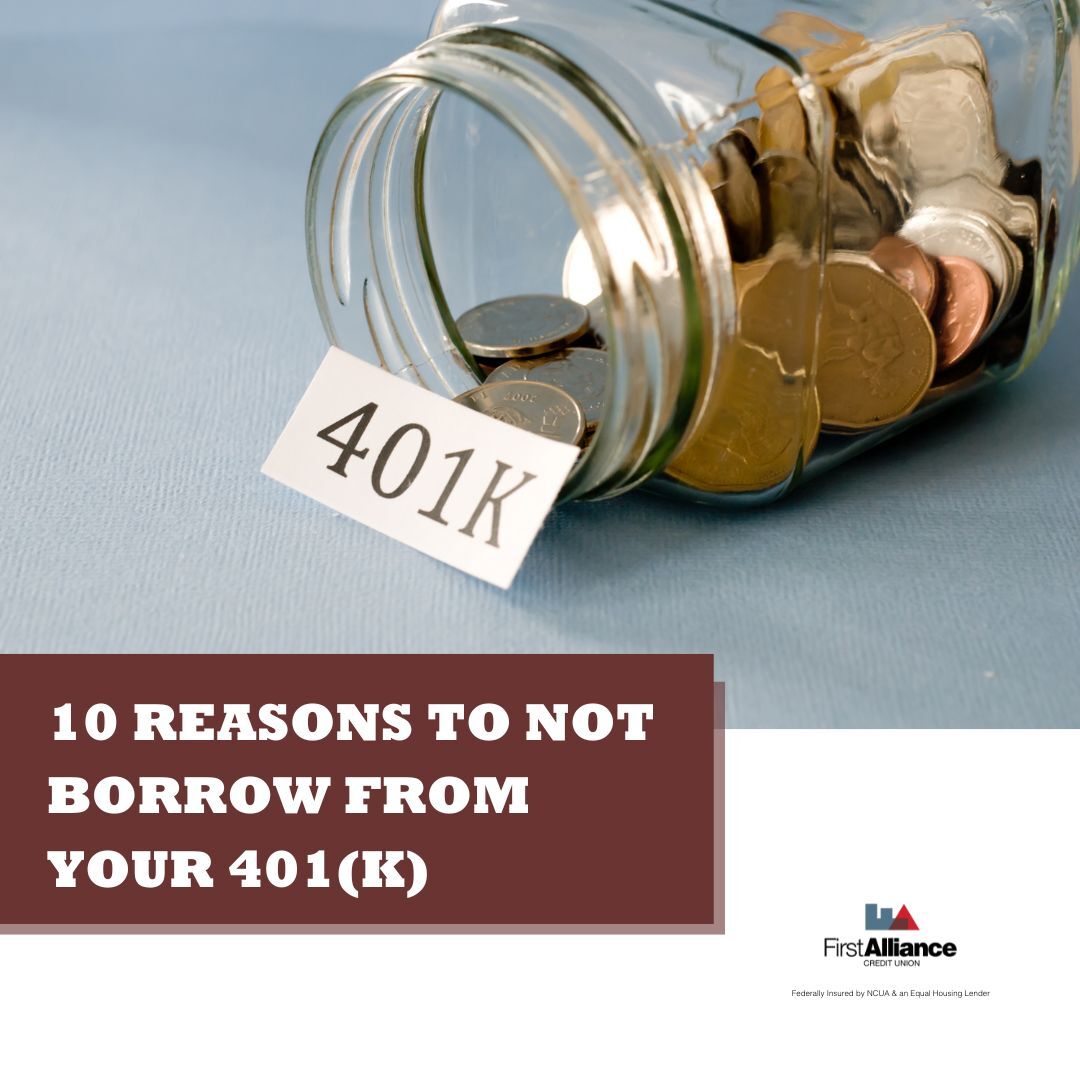401k Plans and Your Retirement
A 401(k) is a retirement savings plan that is offered by companies to their employees. Employees can save a small percentage of money from their...
2 min read
![]() First Alliance Credit Union
:
Oct 22, 2019 6:19:00 AM
First Alliance Credit Union
:
Oct 22, 2019 6:19:00 AM

Many people believe that borrowing from your 401(k) is okay if you need to get some fast money for emergencies, but dipping into your 401(k) is just a bad idea. Borrowing from your 401(k) might not affect you now, but it will definitely hurt in the long run.
Many people prefer to borrow from their 401(k) because the interest rate on it is lower than on a standard loan. People often believe that it is their own money they’re tapping into so it’s a loan they’re getting from themselves, but in all honesty, you could be ripping yourself off.

The only reason you sign up for a 401(k) is to save up for retirement. If you keep tapping into your retirement savings every time you need money even for emergencies, then it will defeat the purpose of your 401(k) account. You might think it won’t affect you that much, but it can lower your standard of living when you retire.
Many 401(k) plan providers don’t let you make any further contributions to the account until you repay the loan you took from your account. This means that all the money you “save up” after the loan will be considered repayment.
If you borrow against your 401(k) and you resign or are fired by the employer, then you are required to pay back the entire loan within 60 days. If you are not able to repay the amount within this period, it ends up becoming a retirement distribution and is subjected to income tax and a 10% withdrawal penalty if you are younger than 55.
If you remain employed, then the deadline to repay the loan is 5 years. If you fail to repay the loan within that period, the remaining loan balance will be considered distribution and will be subjected to income tax and a penalty fee.
You may end up making it a habit of tapping into your 401(k) every time you need money. This will not bode well for the future as you will not have any money left for your retirement.
When you borrow money from your 401(k), it means you are selling your investments. If any of your investments rise in value, you will not get the benefits and profits from them along with the compounding power.
Many plans charge an additional fee if you take out a loan and that amount gets cut from your loan. So if you borrow $1,000 from your 401(k), you lose a percentage of the money right at the start.
Many plans require you to repay the loan through automatic paycheck deduction. This means your income will decrease even further as money for your 401(k) contributions will also be cut from your paycheck.
If you borrow from your 401(k) to pay off another debt, you will still be in debt. Many people think that they are just using their own money, but they’re actually taking out a loan.
Taking a loan from your 401(k) makes you pay taxes twice, as you are repaying the loan with after-tax money when you withdraw money from your funds during retirement, and you will pay taxes on that money again.
The main purpose of your 401(k) is to save up for retirement. If you’re in desperate need of money, then consider all the alternatives before dipping into your 401(k). Your future self will thank you for it.
No matter how dire your emergency is, borrowing from your 401(k) should be considered a last resort. Several alternatives are available, such as taking out a personal loan or refinancing your mortgage.
If you need help, visit First Alliance Credit Union today. They'll be happy to discuss your financial situation with you and help you figure out how to make some good money moves to put you on the road to financial success.

A 401(k) is a retirement savings plan that is offered by companies to their employees. Employees can save a small percentage of money from their...

Most jobs offer some type of benefit above and beyond a steady paycheck. One of the most common types of benefits is the 401(k)—the current...
.jpg)
Quick compare: A Traditional 401(k) lowers your taxable income today and you pay taxes in retirement. A Roth 401(k) uses after-tax money today and...